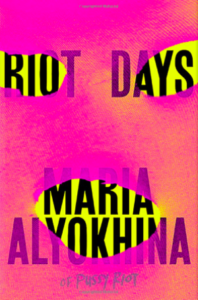In “Riot Days”, her short memoir of the events leading to her incarceration and subsequent release 18 months later, Maria Alyokhina gives us a glimpse of the Russian justice and penal systems. But it is a glimpse, and nothing more.
Alyokhina is a member of the band Pussy Riot, perhaps still best known for their “punk prayer” protest in 2012, at the Cathedral of Christ the Savior in Moscow. After eluding authorities for a while, Alyokhina and two fellow Pussy Rioters were arrested. Most of “Riot Days” is about what ensued: detention, trial, conviction, and imprisonment in prisons in Berezniki near the Ural Mountains, and in Nizhny Novgorod.
Upon arrest, the author and her bandmates were charged with “hooliganism motivated by religious hatred”, with prosecutors seeking a 3 year prison term for each of the accused. In the chapter titled “Russian Trial”, Alyokhina describes a trial which is by turns tedious and absurd: a long line of accusers claiming shock and moral injury, confused witnesses, an accuser who wasn’t present at the church and only “saw the video”, a vomiting dog. Not to mention a sometimes distracted judge:
“The secretary stops recording the proceedings. The judge bows her head and starts doodling.
‘Your Honour, please stop doodling!’ the lawyer shouts.
‘Don’t look at my desk!’ the judge shouts back.”
After she was convicted and sentenced to 2 years in prison, Alyokhina would continue to fight the system from within. Often her protests would fall flat, and she spent months in solitary confinement. Yet a surprising number of times, and in part due to her celebrity, her efforts bore fruit. Notably, on occasions when she was able to tell the authorities what specific law they were violating, she managed to get the guards to rein in their abuses such as stealing from the salaries owed to the prisoners. 
Included in “Riot Days” are some evocative vignettes, as Alyokhina navigates the Russian justice and penal systems. The guards who get upset when the prisoner who gives manicures to everyone in prison, guards and prisoners alike, is about to be released (“Who will do our nails?”) Having nothing to read in prison other than a box full of romance novels. Igor, the chief of criminal investigations, who boasts about dieting and riding 10 miles on his bicycle. The author making sushi rolls for her fellow prisoners, none of whom has tasted sushi before.
With widespread disenfranchisement of those who have been convicted in this country, one of the author’s stories involving voting was quite striking. Alyokhina was a detained prisoner accused of political crimes, and on hunger strike, when this happened:
“In the middle of all this, the clatter of an iron key in the lock of the iron door, and someone roars “You want to vote?”
Despite being weakened by her hunger strike, the author jumped out of her cell. In an elegantly decorated room adorned with a large portrait of Putin, she got to vote in the Russian presidential elections.
“Riot Days” is fragmented, a bit messy, and may not be everyone’s cup of tea. If you are looking for a more comprehensive account of events surrounding the Pussy Riot case, there are other sources you can turn to. Still, the book does an excellent job capturing the mood of those turbulent events. Despite the hardships she suffered, the author manages to ring a note of optimism: even if the system is stacked against you, knowing your rights and fighting for them can take you a long way. As Alyokhina tells herself, in the midst of one of her many battles with prison authorities, “I have to understand the law.”
Riot Days, by Maria Alyokhina (Call No. ML420.A57 A3 2017)
